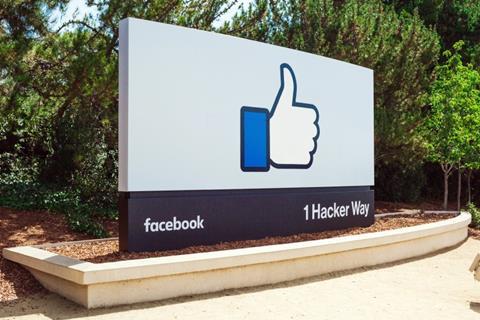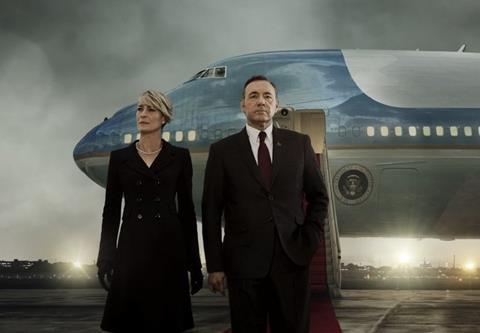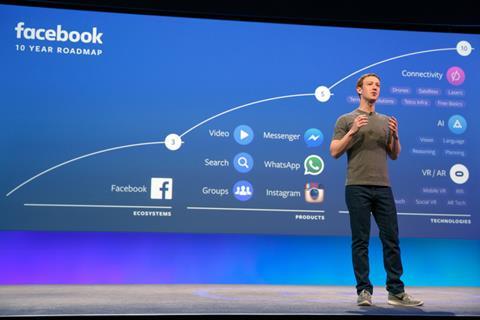Facebook looks set for a move into original content, with reports suggesting that the social media giant has already begun commissioning longform and shortform content.
According to a recent report Facebook could unveil its first batch of programmes next month.

Such a move would give Facebook more control over the content that appears on its platform and help to draw attention to its recently launched video tab. It could also be seen as part of the company’s wider efforts to counter the threat of rival video platform Snapchat.
“All providers should fear Facebook given the wealth of data it has on viewers” – Paolo Pescatore
Chief Executive Mark Zuckerberg has made no secret of his desire to push into original content.
During a February earnings call he said that Facebook would initially focus on short form content, stating that he sees video as “a mega trend”.
“The goal is going to be creating some anchor content initially that helps people learn that going to the video tab — that that’s a great destination where they can explore and come to Facebook with the intent to watch the videos that they want,” Zuckerberg said.

Details around the type and length of programmes are scant, but according to Business Insider, they will be “TV-like” and can be split into two categories: a few high-profile, big-budget shows that would feel at home on TV (the report pointed to Netflix’s House of Cards and Scandal as examples), and shorter programmes of around 5-10 minutes in length that are refreshed daily.
For Enders Digital Media Analyst Joseph Evans, Facebook is likely to be keen to create its own because it wants premium video ad inventory.

“Its current video ad offering depends on autoplay ads that users see as they scroll past on the newsfeed, or that play in between short clips,” he told IBC365.
“Facebook doesn’t have the premium inventory that broadcasters or even YouTube can offer advertisers, so it’s had to promote the questionable value proposition of things like 1-second ad views.
“Long term, Facebook would undoubtedly like to combine inventory that can support 30-second TV-like spots with its data and targeting, to capture even more digital ad spend. This is absolutely vital as TVs get connected and people’s media consumption shifts back to the big screen.”

CCS Insight Vice President of Multiplay and Media Paolo Pescatore cited Netflix for paving the way into commissioning original programming for online distribution. “Everyone is trying to take a different approach,” he said. “But video brings new benefits such as more engagement and importantly new revenue.”
Quality content
Does that mean we are likely to see Facebook invest at a level that would rival the likes of Netflix Amazon?
“Arguably, for now it doesn’t really need to as premium rights owners are happy to distribute via Facebook in order to reach new audiences,” said Pescatore. “It could take a wait and see approach to more about consumer behaviour.”
Evans holds a similar view. He said: “I don’t think we’ll see Facebook investing to the same extent in exclusives or original programming.
“It has been successful so far on a model of basically zero content costs. Of course you have to invest to get high quality longform content, but I think we’re likely to see Facebook making a few highly strategic investments to prove that its platform is suitable for longform, and to get users used to going to Facebook for longform.
“Then it will hope its userbase will make it an attractive place for content owners to distribute their longform video, on a revenue sharing basis, as we’ve seen it attempt with publishers and Instant Articles. Facebook management has suggested as much on the recent earnings call. “Whether Facebook can convince TV businesses to see it as an opportunity rather than a threat is another question.”
Earned media
Zuckerberg reportedly said that “sports is probably something that we’ll want to try at some point”, and Evans said with some caution that it is an obvious genre for Facebook’s push, with a growing number of small, experimental streaming rights coming up for bids.

“Facebook initially went for sport, but lost the first Thursday Night Football deal to Twitter, who reportedly underbid Facebook, and the subsequent one to Amazon, with rightsholders understandably nervous about any online platform with enough heft to threaten lucrative TV deals.”
However, as Pescatore pointed out, sport – particularly premium rights packages - are costly. He said: “Ultimately Facebook needs to invest areas that resonates for its viewers. This will vary by country but there is plenty of scope in entertainment,” he says.
The advantage of opting for original, TV-like programming akin to Netflix and Amazon originals is the generation of a lot of earned media, said Evans. Such a move would also be a considerable opportunity for production companies, particularly in the US and UK that have benefitted from the SVOD services big budgets.
“It is a great time for a content and media owners given the demand to create the next biggest blockbuster,” says Pescatore. “In particular for storytellers and new technology is giving them more freedom to be creative with plots.”
Should broadcasters and media companies be concerned?
Facebook claims some 1.94 billion monthly active users as of the end of March this year, so given the company’s reach, should traditional media companies be concerned?
Paolo Pescatore: “All providers should fear Facebook given the wealth of data it has on viewers. It has successfully made moves in video and is steadily strengthening increasing its presence in this area. This could be the nail in the coffin for broadcasters who failed to monetise moves towards online video.
Joseph Evans: “Broadcasters will be rightly worried that someone like Facebook could do to them what Google did to local press classifieds – offer advertisers a better, cheaper alternative.
“The good news for broadcasters is that to support premium video inventory, you need premium video content, and they will not give that to Facebook willingly for exactly the above reasons. This is why Facebook is having to at least start with original programming. But making successful TV content is not a trivial task, and you get a lot of misses for every hit.
”The institutional expertise involved in a successful longform content strategy still resides overwhelmingly in traditional TV businesses.”
























No comments yet